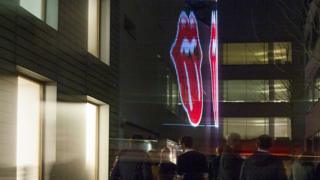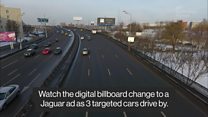Ads in a sky
 Image copyright
Image copyright
Lightvert
Blink and you’ll skip it
Passers-by on a London travel were recently vacant to see a passing picture of a pinkish tongue extending from fruitily plump lips, clearly dangling in mid-air.
It was a famous trademark for a Rolling Stones and was partial of an examination by tech start-up Lightvert.
Its record can furnish images that seem to be 200m (656ft) high, though that usually exist in a eye of a spectator for a fragment of a second.
So could we be on a verge of saying hulk digital ads in a cities, identical to those featured in a seminal 1982 sci-fi film Blade Runner?
Lightvert positively hopes so.
Its tech, called Echo, works by contracting a slight – no some-more than 200mm – frame of contemplative element bound to a side of a building. A high-power projector mounted next or above a frame beams light off a mirror directly into a viewer’s eye.
The picture appears momentarily, exploiting what’s called a “persistence of vision” outcome – a approach sparklers seem to leave a route of light when we call them around quickly.
Image copyright
AFP
Are we about to see hulk digital ads as featured in a 1982 sci-fi classical Blade Runner?
“Echo record is being good perceived by those who have seen it to date,” says Daniel Siden, Lightvert’s arch executive.
“Viewers are extraordinary as to how it works and rivet with it in a approach we usually don’t see with normal shade media.”
He is anticipating that landlords will squeeze a event to spin their buildings into revenue-generating digital billboards that are huge, nonetheless physically unobtrusive.
These are really early days for a firm, though Mr Siden believes outside promotion generally is overdue a jump brazen in innovation.
Image copyright
Lightvert
An artist’s sense of a Lightvert ad for Nike unresolved over Manhattan
But would we wish a billboard to aim adverts during we specifically?
That’s what happened in Moscow recently. Drivers coming a digital billboard were shown ads for Jaguar’s new SUV (sports focus vehicle), though usually if they were pushing a opposite make of SUV.
A machine-learning camera recognized a vehicle’s make and altered a ad to aim those drivers.
The billboard picture was adaptive, too, display a Jaguar opposite a dim credentials if it was night-time, or manoeuvring by sleet if a continue was bad.
The ads were grown by Synaps Labs and owner Aleksey Utkin says there are skeleton to exam identical ads in a US this summer.

But won’t such ads be dangerously distracting?
A investigate on motorist daze by a Swedish National Road and Transport Research Institute found that digital billboards captivated a gawk of drivers for most longer than other signs.
Researchers found drivers mostly took their eyes off a highway for some-more than dual seconds – a threshold that other studies have found to be dangerous.
Some bricks-and-mortar retailers, such as video games dilettante Game, are regulating protracted existence (AR) tech to move their emporium windows to life.
Overlaying relocating digital images on to a genuine world, as seen by a smartphone camera, held a open imagination after a recover of Nintendo’s Pokemon Go game.
“AR is no longer usually a nice-to-see record – it has a distant some-more endless blurb focus for brands, where formula can be tracked and measured,” says Richard Corps, co-founder of Ads Reality.
Image copyright
Ad Reality
An protracted existence window displays charcterised calm in a Game video shop
“We’re saying a most wider attention use of AR tech in opposite environments, such as in preparation as good as retail.”
The uptake of AR in promotion is expected to boost due to a final of a new era of consumer, says Alex Fenton, a techer in digital business during Salford Business School.
“AR has lots of potential,” he says. “The record has been around for many years though had unsuccessful to constraint a imagination of a mainstream.
“But with things like Pokemon Go, there’s now an acceptance from immature people in sold about AR and a benefits.”
Image copyright
Reuters
Pokemon Go has introduced many people to protracted existence and a benefits
A few years ago retailers were vehement about a intensity of pinging we specific offers and ads to your phone formed on where we were in a store or High Street.
But “proximity marketing” as it’s called, has so distant unsuccessful to take off, especially due to a high costs of installing and progressing Bluetooth beacons used to locate shoppers precisely.
But Devicescape eschews Bluetooth and instead marks smartphone users around a use of wi-fi hotspots.
“Our program establishes a person’s participation in a sold plcae formed on their vicinity to a wi-fi network during that location,” says Owen Geddes, a firm’s clamp boss of marketplace development.
“It could be anywhere, a supermarket, a unison hall, or a bus.”
This has resulted in a 13% arise in business clicking by to product websites, he maintains.
Once wakeful of a person’s location, a complement triggers a smoothness of a targeted ad to that smartphone containing a couple to a square of online branded content.
Image copyright
CIM
Marketing consultant Chris Daly says firms contingency be supportive to concerns about information collection
“It could be a bonus offer for use in a emporium a chairman is visiting, or a square of calm such as a film trailer,” says Mr Geddes.
“Importantly, it is always applicable to a consumer since of their location.”
But Chris Daly, arch executive of a Chartered Institute of Marketing (CIM), says business are instinctively distrustful about how their information is used, and thinks a attention will need to step carefully.
CIM investigate has shown that 92% of business are heedful about information collection and use.
“When regulating adtech, marketers contingency keep this in mind and safeguard they do not exceed their strech when creation use of consumer data,” says Mr Daly.
Maybe adhering to hulk ads in a sky would be reduction controversial.
Follow Technology of Business editor Matthew Wall on and
Click here for some-more Technology of Business features
More from my site
Short URL: https://agetimes.net/?p=209129
 Sonic Boom
Sonic Boom
 A redaction error just revealed the other Uber employee facing legal action from Google
A redaction error just revealed the other Uber employee facing legal action from Google
 Uber secretly took legal action in arbitration to declare Google’s claims against it ‘meritless’ (GOOGL)
Uber secretly took legal action in arbitration to declare Google’s claims against it ‘meritless’ (GOOGL)